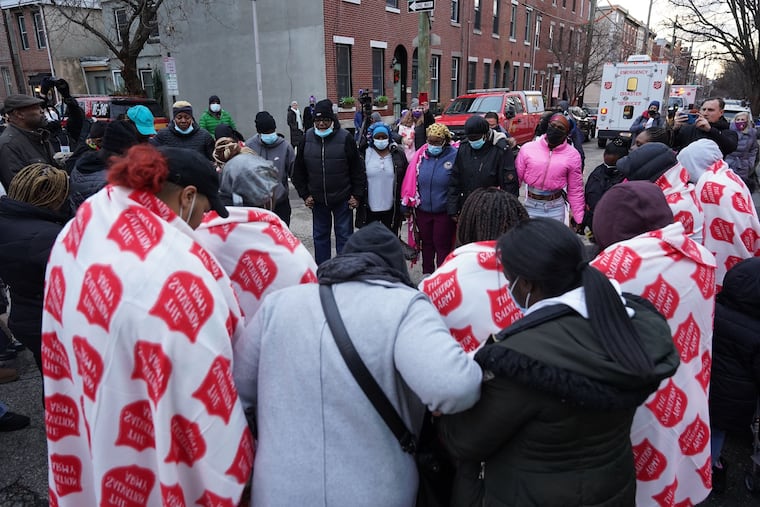Philadelphia must be a ‘city of refuge’ for the 5-year-old survivor of deadly Fairmount fire | Helen Ubiñas
Last week’s devastating fire was an immense loss in a city that already deals with too much loss each and every day.

In its preliminary findings this week, the city reached some devastating conclusions about the fire that killed 12 people, including nine children, in Fairmount on Jan. 5.
Investigators found a lighter near a Christmas tree, which they concluded with “99% to 100% confidence” was the first thing in the house to burn, confirming what a 5-year-old boy — the only person on the same floor as the tree when the fire began before dawn — told first responders in the immediate aftermath.
“We are left with the words of that 5-year-old child, that traumatized 5-year-old child, to help us understand how the lighter and the tree came together with tragic consequences,” said Philadelphia Fire Commissioner Adam Thiel.
Thiel’s words, spoken Tuesday during a news conference inside City Hall, were a gut punch in an already agonizing week after three sisters and their children died in the blaze.
The additional findings were brutal:
There were no working smoke detectors in the unit — five had batteries removed and one was destroyed.
The toxic smoke and fast-moving, fire-generating heat (up to 1,000 degrees at the ceiling) created no visibility inside the rowhome.
Despite firefighters arriving within four minutes of the first call, “sometimes we are too late,” Thiel said.
Thiel also took great — and appropriate — pains not to point blame at the boy who survived the fire. That is just the start of what we owe this child.
Because, my God, imagine what all of this loss does to a 5-year-old.
This is too much for any child to carry. This is not, and never should be, this boy’s burden to carry alone.
We don’t know who this 5-year-old is. We don’t ever need to know. But that doesn’t mean that we shouldn’t be asking questions in his name.
Anytime I think of him, I wonder:
Will he get the care he needs, not just today but five and 10 years from now when the memory of this nightmare has faded for most of us?
What can we, as individuals and a community, do to help?
Does he know he doesn’t need to shoulder this alone?
These questions led me to Accidental Impacts, a website turned virtual support group for people who have caused accidental deaths or injury, and the Rev. David W. Peters. Peters is a board member and a national expert on “moral injury” who has written an upcoming book about the topic. When he was 19, while driving to church, his car struck a motorcycle, killing the passenger and injuring the driver.
When I told Peters about the fire, and the discomfort and sadness over this little boy, he said it was the right response under the circumstances. It underscored that we care about what happens next.
“This little person is going to grow up and has to live a full life,” he said. And drawing from his own experience, Peters said it can be a long and often solitary road filled with guilt and shame, and little help.
“Either people don’t want to talk about it, or they don’t know how,” he said. “They either try to minimize your discomfort or their discomfort by saying, ‘Well, it was just an accident, no big deal,’ or they look at you in horror, like, ‘How could you have done that?’ when in reality, we’re all about 15 minutes away from something like this.”
It’s not hard to name what this little boy needs going forward: support, care, compassion, love.
But Peters gave it another name: a city of refuge.
It’s a reference to the six cities in the Old Testament where someone who had accidentally caused harm could safely live the rest of their life. But really it speaks to any space where our most vulnerable and wounded can feel sheltered, and protected.
The Fairmount fire was an immense loss in a city that already deals with too much loss each and every day.
As my colleagues on the editorial page laid out last week: “On Wednesday, the city woke up to a nightmare, but it cannot be called unimaginable. … On a typical Wednesday over the last year, at least three people have died of overdoses and one or two others were murdered. And that does not begin to consider the daily death toll from COVID-19.”
We — citizens, public officials, and, yes, even this newspaper — need to address the everyday losses to which we increasingly have grown numb with the same vigor and compassion as the singular events that briefly bring us to our knees.
That means, above all, ensuring that everyone has access to safe and affordable housing — to prevent tragedies, not just react to them.
It also calls for long-overdue urgency that Kevin Carter, clinical director of the Uplift Center for Grieving Children, said could begin by asking a key, and sobering, question:
Who gets to be safe?
The answer to that goes beyond this one event and this one child, to Philadelphia finally becoming a city of refuge for all of its children.